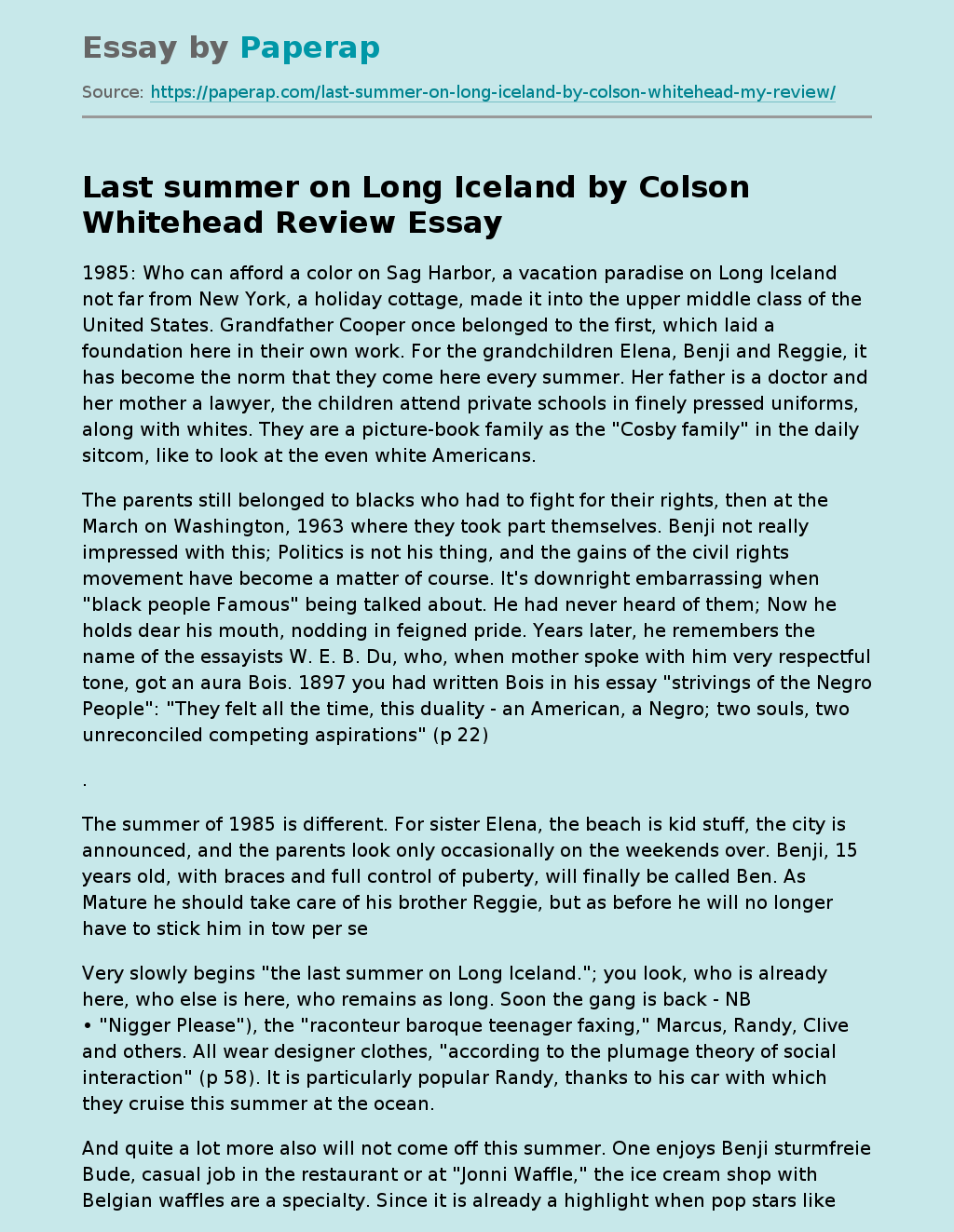1985: Who can afford a color on Sag Harbor, a vacation paradise on Long Iceland not far from New York, a holiday cottage, made it into the upper middle class of the United States. Grandfather Cooper once belonged to the first, which laid a foundation here in their own work. For the grandchildren Elena, Benji and Reggie, it has become the norm that they come here every summer. Her father is a doctor and her mother a lawyer, the children attend private schools in finely pressed uniforms, along with whites.
They are a picture-book family as the “Cosby family” in the daily sitcom, like to look at the even white Americans.
The parents still belonged to blacks who had to fight for their rights, then at the March on Washington, 1963 where they took part themselves. Benji not really impressed with this; Politics is not his thing, and the gains of the civil rights movement have become a matter of course. It’s downright embarrassing when “black people Famous” being talked about.
He had never heard of them; Now he holds dear his mouth, nodding in feigned pride. Years later, he remembers the name of the essayists W. E. B. Du, who, when mother spoke with him very respectful tone, got an aura Bois. 1897 you had written Bois in his essay “strivings of the Negro People”: “They felt all the time, this duality – an American, a Negro; two souls, two unreconciled competing aspirations” (p 22).
The summer of 1985 is different. For sister Elena, the beach is kid stuff, the city is announced, and the parents look only occasionally on the weekends over.
Benji, 15 years old, with braces and full control of puberty, will finally be called Ben. As Mature he should take care of his brother Reggie, but as before he will no longer have to stick him in tow per se.
Very slowly begins “the last summer on Long Iceland.”; you look, who is already here, who else is here, who remains as long. Soon the gang is back – NB
“Nigger Please”), the “raconteur baroque teenager faxing,” Marcus, Randy, Clive and others. All wear designer clothes, “according to the plumage theory of social interaction” (p 58). It is particularly popular Randy, thanks to his car with which they cruise this summer at the ocean.
And quite a lot more also will not come off this summer. One enjoys Benji sturmfreie Bude, casual job in the restaurant or at “Jonni Waffle,” the ice cream shop with Belgian waffles are a specialty. Since it is already a highlight when pop stars like Lisa Lisa or UTFO rapper to stand in line for a scoop of ice cream, even if they have completely unannounced Adidas clothes.
Randy gets the idea with the air guns. Really excited when Randy initially done a robin. Later, he aimed at NBs feet and shouts: “dance, nigger, dance” (p 159). Really uncool it is only Benji. Marcus, the Loser, tests and irritates you distances and pain points from. A bullet penetrates just below Benji’s eye into the skin. Besides, the author mentions that one comes later in life from the clique by real bullets killed, another is paralyzed from the waist. Why? How so? The author remains true: Just nothing spectacular.
Benji experienced the racial issue, albeit in pebble smooth sanded shaping: In Sag Harbor, the beach is one of the blacks, the whites, however, the shore area behind the city. “Every infiltration had to be checked. A few White came up the beach, so we picked up the binoculars” (p.46). The guys in Benji’s clique celebrate their union with an internal greeting ritual by hippem hand clapping. With the word “nigger” they go to casual, although it causes irritation among parents, where its historical burden is close familiar; on the other hand use it themselves to asocial to designate, within their own race.
The emotions surge to its climax on, as a white adult – but praise for good performance and not realizing what he triggers – patting black on the soft springy wealth of Benji’s curling: The feel all from the clique as “racist shit”; so someone would “kick your ass” (Hubbard, 116). But then they leave it, of course, in the soft talk about it.
This retrospective of the author Colson Whitehead is not a rousing novel. Quite calmly he tells individual episodes of a black youth of the eighties, which focuses on the narrator Benji. It gives the impression of a superficial generation that is interested in bands and their songs, for clothes, sitcoms, movies, frozen and canned foods and not much else. What an outcry when the Coca-Cola Company in 1985, the recipe changes! This hot summer, which is leisurely and offers little action will be their last; their paths will separate, they will enroll at universities and start training. When Benji is finally freed from his braces, kissed for the first time, he feels almost like a man.
Not every reader will love this classic American novel. For example, the law requires special culture of songs, literature and social policy some insider knowledge. Whoever brings and / or gets involved in the poignant, subtle observations and can dissolve the intellectually spicy, ironic and humorous writing style of the author like a scoop of ice cream slowly in the mouth, which can feel the special feeling of last summer on Long Iceland.
“Last Summer on Long Iceland” by Colson Whitehead. (2019, Nov 18). Retrieved from https://paperap.com/last-summer-on-long-iceland-by-colson-whitehead-my-review/

